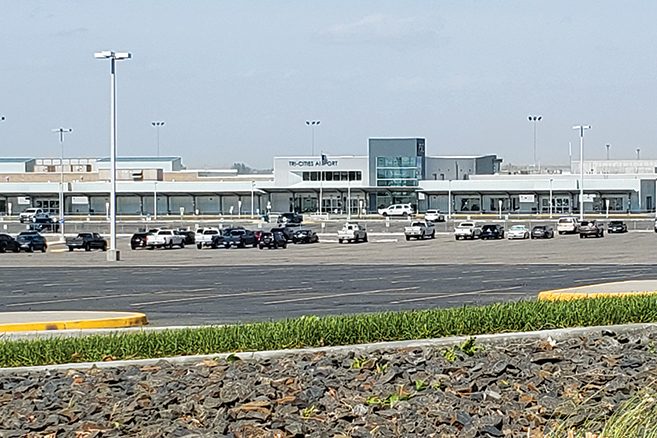
Home » Aviation community perplexed by CARES Act airport funds
Aviation community perplexed by CARES Act airport funds

May 15, 2020
Port of Pasco officials are delighted and perplexed by the $5.9 million they received from the $2.2 trillion CARES Act to support the Tri-Cities Airport during the coronavirus pandemic.
Airport traffic is down more than 95 percent, casting its ability to pay the bills into chaos.
The government money from the Coronavirus Aid Relief and Economic Security Act will cover the Pasco airport’s $2.1 million debt payment, which is normally paid with passenger fees, and cover seven months of operating expenses, which take between $500,000 and $550,000 a month.
The port, which owns the airport, is grateful for the support. Or it was, before it saw what its less busy neighbors received.
The Walla Walla and Pendleton, Oregon, airports received $18 million and $17 million, respectively. The Wenatchee and Pullman airports also received $18 million, the same amount headed to King County International, aka Boeing Field. Marion Sweet Field in Eugene, Oregon, landed $22 million.
“I don’t think anyone felt they got shortchanged until they saw the list,” said Buck Taft, the airport’s manager.
While they are grateful for the money, the Port of Pasco is joining a national chorus protesting what they see as “terrible” discrepancies in how distributions were calculated.
“It’s certainly not done right, the way it’s done,” said Pasco Commissioner Jim Klindworth during the commission’s regular business session on April 25, held via Zoom.
The pattern was repeated across the region and the country, drawing the attention of U.S. Rep. Steve Cohen, D-Tennessee. Cohen asked the FAA administrator to suspend payments until a more “equitable” distribution is developed.
Klindworth supported the move.
Taft said it appears the payments were based on the debt and budget reserves of individual airports. The healthier the facility, the less money it received.
Taft is not complaining though. The $5.9 million is at the top end of what he expected. It provides breathing room for an organization whose business model has collapsed, if temporarily, because of the coronavirus pandemic.
Passenger boardings dropped by 60 percent in March. It will be down by 95 percent or more in April, he said. Airlines are canceling flights or taking off with few passengers. Fifteen is a full load. Four is common.
No passengers mean no passenger fees to pay the airport’s debt. Fewer departures and arrivals mean fewer landing fees. Taft said the CARES Act money can be used for operations or capital. He prefers the former, saying it is too uncertain what the future holds to launch a capital project.
He would love to repave the airport parking lot while it is mostly empty.
But Taft does not know when traffic will return. If it does not, the airport may need the $700,000 the parking lot project would cost to pay its day-to-day bills.
The CARES Act also supplied money to support airlines. In exchange, airlines had to keep semi-regular flight schedules to their airports.
All four airlines serving Pasco took CARES Act funding, which compels them to deliver at least nominal services.
Alaska, Delta and United Airlines must schedule at least five flights a week from Pasco. Allegiant Air must schedule three.
Scheduling is one thing. Flying is another. Taft said flights appear to get canceled at random. Those that do go out have few passengers and may fly winding routes. Pasco records about seven flights a day.
And the routes they are flying have gotten creative.
Taft said it is not clear who is still flying. He is maintaining social distancing in his office on the airport’s second floor. The busy terminal is a ghost town. Even the Transportation Security Administration checkpoint is deserted between planes with officers sent home.
Anecdotally, passengers dress for leisure.
“You don’t see the suit and tie in here very often,” he said.
The Richland and Prosser airports, both run by the Port of Benton, received $69,000 and $30,000, respectively.
As it stands, the FAA awarded grants to 64 Washington airports, ranging from token amounts such as $1,000 for Cle Elum Municipal, to $192 million for Seattle-Tacoma International, a global hub.
Those receiving $1 million or more were: Bellingham International ($5 million), Wenatchee’s Pangborn Memorial ($18.1 million), Orcas Island ($1 million), Pullman/Moscow Regional ($18.1 million), Boeing Field/King County International ($18 million), Spokane International ($29.6 million), Walla Walla Regional ($18 million) and Yakima Air Terminal/McAllister Field ($1.3 million).
Local News Transportation
KEYWORDS may 2020





